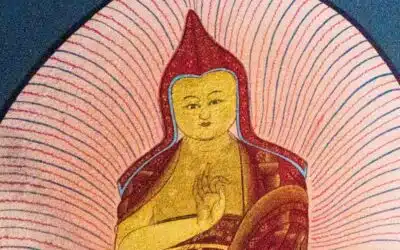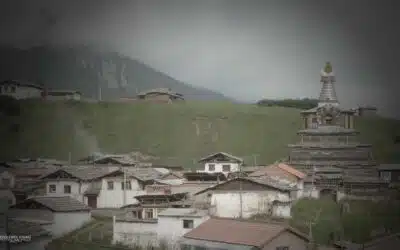The Butterfly and the Garuda

Written by Nils Derboule
Blog | Culture and tradition | Dzogchen philosophy | Reflections on life | The Dzogchen basics
In this article “The Butterfly and the Garuda”, Nils Derboule talks about the chaos of life, control, and the way Dzgochen sees it.
The butterfly and the garuda
The “butterfly effect” is a nice name for a phenomenon described by physicists a few decades ago: chaos. The principle behind these “chaotic equations” is that they give a strongly different result depending on the initial data. A tiny variation in original conditions (the flapping of a butterfly’s wing in the Amazon rainforest) can trigger a cyclonic storm in the North Atlantic.
At the time of this discovery, the scientific community began to imagine witnessing them everywhere, even in the times at which buses pass through Mexico City, depending on the number of people waiting at the stops. Then they changed their minds. Admittedly, chaos is part of nature, but perhaps we’d pushed the boundaries little too far.
Yet it is easy to imagine that our lives are governed by these chaotic equations. Who can predict with certainty what will happen next year, next month, or even the next minute? Causes and effects are so innumerable and complex in their relationships! Could it be that a broken shoelace makes us miss the bus, and in anger we take it out on a poor stranger, adding a stone to her grief that will lead her to depression? Or that a school bell plunges us into nostalgia for the whole week before our wedding, making our promised one doubt? Or that, because of a stubborn coffee stain, we miss the encoutner that would change the course of our lives?
“Of course all cause precedes effect but when we concentrate properly, we discover that this is by no means true in itself. This is one of the most fundamental key points of the teachings of the Great Perfection: “Apparent, but non-existent”.”
How much control do we have over our lives? Truly, none. Of course, we try to appease ourselves by scheduling, planning and anticipating, and the more we fear the future, the more we want to control it. But if we think about it, it is impossible to know the infinity of possibilities. How certain can we be that we won’t die tonight?
In the Hindu and Buddhist traditions, only the god Brahmā perceives all this, for he is the knowing mind of all possibilities, the basis of all cause and effect. We call this reality “Brahmā’s net”, and we live in its meshes. But Brahmā is none other than our own mind, apprehended in its vastest, most universal aspect. Within Brahmā’s knowledge, all three times – past, present and future – are present. From then on, the certainty of knowing everything seems total. We are the universe: a total symbiosis of form, movement and will.
And yet Brahmā is also mistaken, for all this is perfectly illusory. Of course all cause precedes effect but when we concentrate properly, we discover that this is by no means true in itself. This is one of the most fundamental key points of the teachings of the Great Perfection: “Apparent, but non-existent”. Effects and causes -in short all possibilities- appear spontaneously within the primordial nature of our mind, as reflections of its empty nature.

For yogis and yoginis, practitioners of the Dzogchen path, this discovery is often a shock. A shock repeated with each observation, which gives a direct vision of the very illusory nature of cause and effect. How can we control what is no longer there the next moment? What fear can there be, if nothing is really there and nothing disappears? Controlling our life is no longer an objective, because we understand that it is impossible. And yet, without fatalism, we never abandon vigilance of our actions, because we know that everything counts.
Then one day, the yogi and yogini realize that nothing is unknown. Primordial nature is the basis of everything; there is nothing outside or inside, not even the experience of this essential nature. He/she is then like a garuda: that mythical bird which knows immediately and perfectly how to fly as soon as it pierces its shell.
As long as the body, the ultimate remnant of cause and effect, remains, the yogi and yogini move fearlessly, in total surrender and profound certainty. They feed on the late bus and the school bell: this dance of phenomena is that of their primordial nature. Then, when death comes, when the shell breaks, it’s an immediate flight into the pure sky of primordial freedom. And all is Great Perfection, once and for all.
More Posts
Phenomena
"Phenomena" is the second entry in a new category designed to improve understanding of essential Dzogchen words and concepts.
The Story of the First Masters: Manjushrimitra
We continue the Stories of the First Dzogchen Masters with Manjushrimitra, who structured the verses of Dzogchen into three series.
Diebu
In this article, “Diebu,” Mila Khyentse discusses the places of the lineages, particularly that of Diebu.



